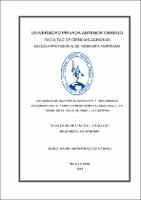Influencia de una fertilización NPK y tres abonos orgánicos en la producción de cebolla (Allium cepa L.), cv “sivan” en el Valle de Chao – La Libertad

View/Open
Download
(application/pdf: 970.7Kb)
(application/pdf: 970.7Kb)
Date
2014Author(s)
Hernández Gutiérrez, Josué David
Metadata
Show full item recordAbstract
El presente trabajo de investigación buscó determinar la influencia de una fertilización NPK y tres abonos orgánicos en la producción de cebolla Allium cepa L. Cv. Sivan en el valle de Chao, provincia de Virú.
El diseño estadístico empleado fue bloques completamente al azar, con 5 tratamientos incluyendo el testigo y 4 repeticiones.
Se observó que dos de los tres abonos orgánicos tuvieron rendimientos significativos acompañados de una fertilización NPK (150 – 80 – 150).
Los resultados indican que la mejor producción de bulbo de cebollas, lo obtuvieron los tratamientos A (Humus de Lombriz + NPK) con 50,833.33 kg/ha y el tratamiento C (Kimelgram + NPK) con 49,951.39 kg/ha, además que estos tratamientos obtuvieron el mayor número de hojas por planta en promedio y el mayor rendimiento de bulbos de primera calidad.
El tratamiento E (testigo) fue el que tuvo el menor rendimiento, menor número de hojas, la menor altura de planta, pero la mayor producción de cebollas de tercera calidad. The present investigation sought to determine the influence of
nitrogen, phosphorus, potassium fertilization and three organic fertilizers in
the production of onion Allium cepa L. Cv. Sivan in the valley of Chao,
Virú.
The statistical design was a randomized complete block with 5
treatments including 1 control group and 4 replications.
It was noted that two of the three organic fertilizers treatments were
accompanied by a significant NPK (150 - 80 - 150) fertilization.
The results indicate that the most production of bulb onions, were
obtained in the treatments A ( Humus + NPK) with 50833.33 kg / ha and
treatment C (Kimelgram + NPK) with 49951.39 kg / ha, these treatments
also obtained the highest number of leaves per plant on average and the
highest production rates of bulbs in the greatest quality.
The E (control) treatment was the one who had the lowest yield,
fewer leaves, reduced plant height, but increased production of onions
third grade .
Collections
- Ingeniería Agrónoma [107]

